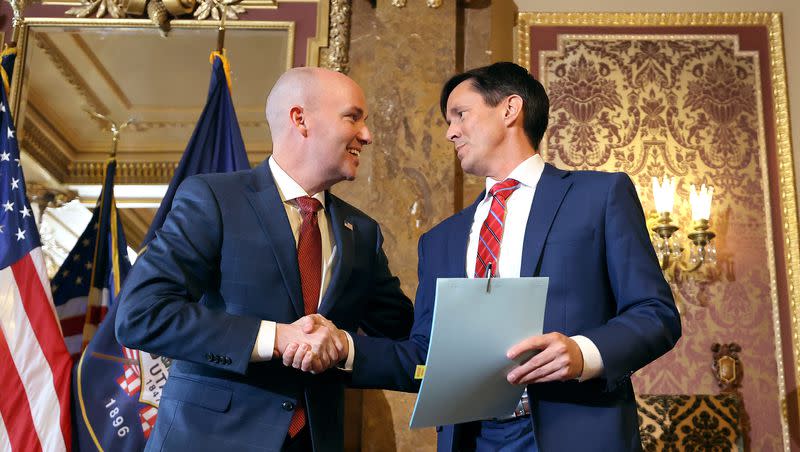Amid legal challenges, Utah’s unique social media laws may change. Here’s how

Amid lawsuits challenging the “first of their kind” social media bills, Utah lawmakers are working toward making changes to the legislation.
The Utah Social Media Regulation Act keeps minors from using social media from 10:30 p.m. to 6:30 a.m., but gives parents the ability to override the curfew. It also requires Utah minors to obtain parental consent to have social media accounts and gives parents the ability to see all posts and messages on their children’s accounts. The law also prevents social media companies from collecting minors’ data and targeting minors’ accounts for advertising.
When he signed the bills into law in March 2023, Gov. Spencer Cox emphasized their uniqueness.
“These are first of their kind bills in the United States,” he said. “And that’s huge that Utah is leading out on this effort. We have lots of states that are interested and I know we’re all having conversations with other governors, other legislators and other states. I suspect that you will see lots of bills like these moving forward.”
These restrictions were set to begin March 1, but with the legal challenges, Utah state Sen. Kirk A. Cullimore, R-Draper, is suggesting they instead start on Oct. 1. He’s introduced SB89 in the Utah Legislature to make that change. The bill was favorably recommended Wednesday by the Senate Judiciary, Law Enforcement and Criminal Justice Committee.
“I think the ideas are sound,” Cullimore said about the Social Media Regulation Act. “Last year, Utah was the tip of the spear on this issue. So, we knew that whatever we were going to do was going to be subject to potential challenges.”
The intent, Cullimore said, is to “push off the implementation date so that can give the court reason enough to pause litigation and save everybody some attorney time and effort.” The repeal and replace amendments are being sponsored by Rep. Jordan Teuscher, R-South Jordan, whose bill is currently in progress and not yet available to the public.
“We knew that it was going to take some more time to develop and to link arms with social media companies and some of the big players to find the right policy,” he said.
As for what to expect from the new bill, Cullimore said, “I think a lot of the same principles are still going to apply where we want to have parent parameters around the amount of time of use and who they’re communicating with. We want to have parameters around what data is being collected on minors, the type of algorithms that are being pushed on minors to create potentially addictive behaviors in social media at such a young age.”
Regarding age verification, Cullimore pointed toward the Child Online Protection Act, which protects children under the age of 13. “The fact that the onus is on the social media companies to know who the person is — consumers — and who they’re dealing with and when you’re dealing with a minor, the expectation is that you’re going to deal with them in a different way,” he said.
Cullimore added that when it comes to parental consent, “we can put expectations on the social media companies that they have that tool available for parents, and by doing so, they may be able to avoid it.”
Teuscher’s bill is not yet public, and once it is made public, other potential changes will be known.
On Tuesday, Senate President Stuart Adams indicated that he’s still focused on finding ways to mitigate harm caused by social media. “We will continue leading the nation in protecting kids against social media,” he said in his opening remarks in the House chamber. “We will hold social media companies accountable for the harm they are inflicting upon our youth. And we will stand for our children and proudly fight the litigation.”
Utah legislators’ focus on social media comes amid increased scrutiny of social media’s impact on young people. During a visit to Utah Tuesday, U.S. Surgeon General Vivek Murthy said during recent visits with college students, they spoke about how social media was “stealing away their self-esteem and harming their friendships.”
Related
There are two suits challenging the Utah Social Media Regulation Act. One was filed by NetChoice, a tech industry group. The suit described it as “an unconstitutional attempt to regulate both minors’ and adults’ access to — and ability to engage in — protected expression.”
NetChoice’s suit was filed on Dec. 18, 2023, and claimed that “The act restricts who can express themselves, what can be said, and when and how speech on covered websites can occur, down to the very hours of the day minors can use covered websites.”
The Utah Attorney General’s office previously told the Deseret News, “The State of Utah is reviewing the lawsuit but remains intently focused on the goal of this legislation: Protecting young people from negative and harmful effects of social media use.”
Another suit challenging the legislation was filed Friday by the Foundation for Individual Rights and Expression. The suit alleged that the act “imposes an elaborate surveillance regime and mandates censorship, irrespective of parents’ views.”
“Utah ignored less restrictive avenues or media literacy efforts, immediately resorting to a sledgehammer of a law,” foundation attorney Kelley Bregenzer said. “Utah’s clumsy attempt to childproof social media should be unfriended immediately.”
Cox had previously indicated in a December press conference that the state was prepared to defend this legislation amid challenges. “We will vigorously defend these laws, we are prepared for it.”
Contributing: Brigham Tomco, Suzanne Bates

